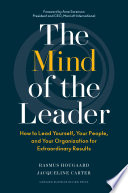

Mindfulness is a core principle in 'The Mind of the Leader.' The book emphasizes the importance of leaders being present and aware of their thoughts, emotions, and surroundings. Mindfulness leads to better decision-making and enhances the ability to connect with team members. By practicing mindfulness, leaders can cultivate a calm and focused mindset, which is essential for navigating the complexities of modern business environments. This practice not only improves personal well-being but also fosters a culture of mindfulness within teams, promoting collaboration and innovation.
Continue readingThe book highlights the significance of emotional intelligence (EQ) in effective leadership. Leaders with high EQ can better understand and manage their own emotions while also empathizing with the emotions of others. This skill is crucial for building strong relationships, resolving conflicts, and motivating team members. The authors argue that emotional intelligence should be prioritized alongside traditional intelligence (IQ) in leadership development programs. By enhancing their EQ, leaders can create a supportive and productive work environment that drives engagement and performance.
Continue readingA key theme in the book is the concept of purpose-driven leadership. The authors assert that leaders who articulate a clear purpose and vision can inspire their teams to align their efforts towards common goals. Purpose-driven leaders are more likely to foster a sense of belonging and commitment among their team members. The book provides insights into how leaders can define and communicate their purpose effectively, encouraging a culture of shared values and collective ambition. This alignment not only boosts morale but also enhances organizational resilience and adaptability.
Continue readingEmpowerment is another central idea in 'The Mind of the Leader.' The authors argue that effective leaders empower their team members to take ownership of their work and make decisions. This empowerment fosters creativity and innovation, as team members feel trusted and valued. The book discusses various strategies for leaders to delegate authority, provide support, and encourage autonomy. By creating an environment where individuals feel empowered, leaders can unlock the full potential of their teams, leading to improved performance and satisfaction.
Continue readingThe authors emphasize the importance of trust and psychological safety in teams. Leaders play a crucial role in creating a safe environment where team members feel comfortable expressing their ideas and concerns without fear of judgment. The book outlines practical approaches for leaders to build trust, such as open communication, active listening, and demonstrating vulnerability. When team members feel psychologically safe, they are more likely to collaborate, share innovative ideas, and take calculated risks that drive organizational success.
Continue readingThe book discusses the significance of cultivating a growth mindset within organizations. Leaders are encouraged to model and promote a culture of continuous learning and improvement. By embracing challenges and viewing failures as opportunities for growth, leaders can inspire their teams to adopt a similar mindset. The authors provide strategies for encouraging experimentation and learning, which can lead to increased resilience and adaptability in the face of change. A growth mindset not only enhances individual performance but also contributes to the overall agility of the organization.
Continue readingFinally, 'The Mind of the Leader' addresses the need for sustainable leadership practices that prioritize long-term success over short-term gains. The authors argue that leaders must consider the broader impact of their decisions on employees, customers, and society. Sustainable leadership involves ethical decision-making, social responsibility, and environmental stewardship. The book encourages leaders to integrate sustainability into their strategic vision, fostering a culture that values integrity and accountability. By doing so, leaders can build trust with stakeholders and contribute to a more sustainable future.
Continue readingThe reading time for The Mind of the Leader depends on the reader's pace. However, this concise book summary covers the 7 key ideas from The Mind of the Leader, allowing you to quickly understand the main concepts, insights, and practical applications in around 23 min.
The Mind of the Leader is definitely worth reading. The book covers essential topics including Mindfulness in Leadership, Emotional Intelligence, Purpose-Driven Leadership, providing practical insights and actionable advice. Whether you read the full book or our concise summary, The Mind of the Leader delivers valuable knowledge that can help you improve your understanding and apply these concepts in your personal or professional life.
The Mind of the Leader was written by Jacqueline Carter, Rasmus Hougaard.
If you enjoyed The Mind of the Leader by Jacqueline Carter, Rasmus Hougaard and want to explore similar topics or deepen your understanding, we highly recommend these related book summaries:
These books cover related themes, complementary concepts, and will help you build upon the knowledge gained from The Mind of the Leader. Each of these summaries provides concise insights that can further enhance your understanding and practical application of the ideas presented in The Mind of the Leader.